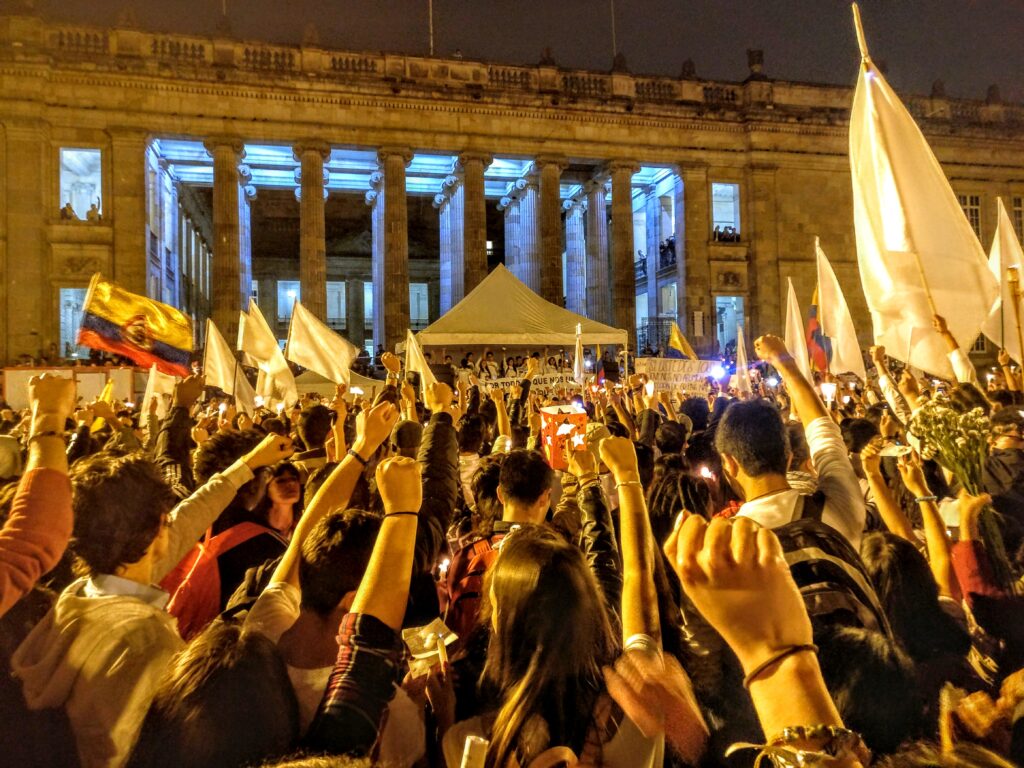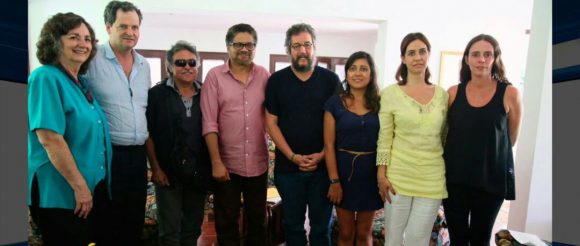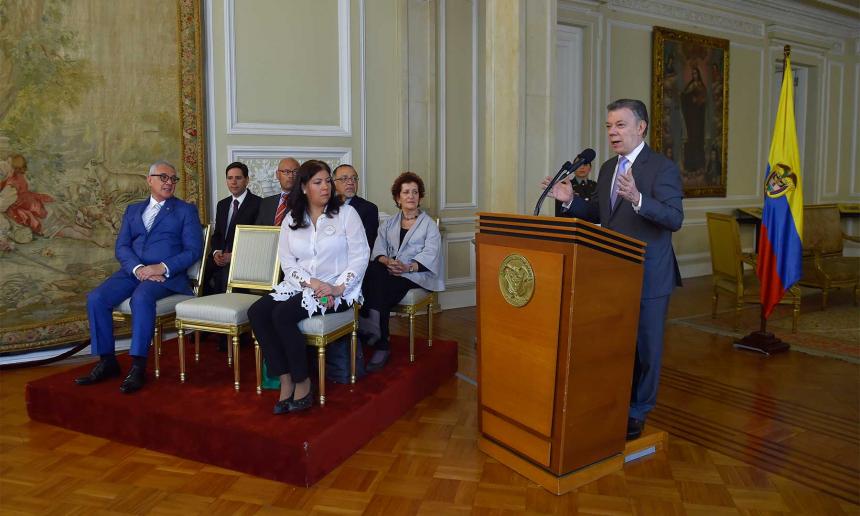NIMD and the Colombian Peace Agreement: Towards a more equal and inclusive society

In Colombia, there is not a single person alive who has known long-lasting peace.
NIMD Country Director Ángela Rodríguez, like so many Colombians of her generation, grew up in fear of bombs, kidnappings and civil war.
A daughter of ophthalmologists, she grew up in a caring and hardworking family. She developed an interest for politics from an early age, and therefore it was a logical choice for her to study political science, and policy and development.
Since the mid-sixties, the main conflict in Colombia has been between the Government and the Colombian Revolutionary Armed Forces (FARC). Over the years, this conflict has caused the death of an estimated 250,000 people and left 7 million internally displaced.
One of its root causes was the political exclusion of large parts of society, which contributed to the emergence of illegal armed groups such as the FARC.
With a deep desire to promote reconciliation and fight polarization in her country, Ángela decided to dedicate herself to working towards a better political system.

When NIMD started working in Colombia in 2010, it was in an effort to strengthen political parties and make the political system more open and inclusive.
At that time, Ángela was working at UNDP, through which NIMD initially implemented its programmes. When NIMD decided to found its own country office in Colombia, Ángela decided to join and help set up the office.
Through years of working closely with most of the country’s political parties and building up good personal relations, NIMD has managed to gain their trust. NIMD’s impartiality, local ownership and long-term commitment are also crucial to its ability to work with parties that represent very different political ideologies.
So, through its regular work with political parties and government institutions, NIMD already had a good relationship with the Colombian Government when the peace process began.
But, foreseeing the support that would be needed on both sides of the table after a peace agreement was reached, the organization took a bold step and reached out to the FARC during the earlier stages of the negotiations to offer its help.
When it became apparent in 2016 that peace negotiations between the Colombian Government and the FARC were coming to a satisfactory conclusion, the negotiation table in Havana invited Ángela, as NIMD Colombia’s Executive Director, for preliminary talks with both parties to discuss the objectives of the Special Electoral Mission that NIMD was invited to compose.
Changing perspectives: Meeting the FARC
Growing up in Colombia’s capital, Bogotá, all Ángela ever heard was that the FARC was the enemy and the cause of all the violence, kidnappings and disappearances.
Therefore, on a personal level, she found it hard to meet with them at first. But there was no turning back.

When she entered the meeting room in complete silence, she immediately recognized two of the main commanders of the FARC. As the conversation turned to the political roots of the conflict, Ángela struggled to stay focused.
She couldn’t believe where she was.
Yet, the FARC commanders were friendly, and there was laughter during the meeting. They said goodbye with a hug.
However, something was not right for Ángela and she left the place feeling uncomfortable without knowing exactly why. She started to go back through every comment and gesture in her mind, trying to identify something inappropriate, but she was sure the commanders had shown her nothing but respect.
The next day she shared the experience with her father, who had first triggered her interest in politics, and taught her how to interpret the newspapers filled with stories about assassinations of presidential candidates and bombings. For him the answer was easy: Ángela had started to humanize the monster she grew up hating and fearing: the start of reconciliation after conflict.
For Ángela, the unexpectedly fruitful meetings reiterated the importance of always keeping an open mind and being willing to dialogue with your perceived adversaries. The talks had focused on the necessity of inclusion and the need for all people to be able to participate in politics.
The creation of a political party representing both the views and the constituency of the FARC would therefore be crucial for stable and lasting peace in Colombia.
With this in mind, Ángela offered NIMD’s institutional support and expertise to the FARC to help it transition to a legal political party.
Towards stable and durable peace
Not long after, in September 2016, both parties signed the (initial) historic Peace Agreement in Cartagena, ending over 60 years of internal conflict.
It was a development welcomed by both sides, and hailed a victory by Iván Márquez, the FARC’s top negotiator:
“We have won the most beautiful of all battles: [the battle] of peace for Colombia. The battle with weapons ends and the battle of ideas begins.”
Colombia’s President, Juan Manuel Santos also underlined the importance of the FARC’s transition:
“Today, as you begin your return to society, as you begin your conversion into an unarmed political movement […], I welcome you to democracy”.
However, this process was about to take an unexpected and disconcerting turn. The Peace Agreement was to be approved by the Colombian people in a plebiscite on 2 October 2016, but against all expectations, the “NO” side won the referendum.
The shock result seemed to paralyze the country.
People were crying in the streets of Bogotá, and across the country. Ángela was one of those people; in total disbelieve she felt she was seeing her dream of peace in Colombia collapse before her eyes.
Yet, the following weeks were astounding, with thousands and thousands of mostly young people taking to the streets in Bogotá and other major cities, protesting peacefully and demanding peace.
The negotiating parties tried to incorporate as many objections of the NO camp as they could, and a revised Peace Agreement was approved by Congress in December.
The work towards stable and durable peace could finally start.
NIMD’s role
Ángela’s involvement throughout the negotiating process resulted in NIMD being the only Dutch NGO to have two official roles under Point 2 (political participation) and Point 6 (implementation and verification) of the Peace Agreement.
For Ángela, the chance to contribute to the reform of the political system, and thereby help to make politics accessible for so many of her compatriots, is literally writing history.
She was so honoured to be able to contribute to peace in her country and the establishment of a more united Colombia that she could not wait to start.

NIMD quickly got to work as a member of the selection committee for the Special Electoral Mission, a group responsible for providing recommendations to improve the electoral system. The Special Electoral Mission strived to make the political system more inclusive, opening up democratic space for new actors and thereby mitigating the chances of a relapse into armed conflict.
Ángela led the technical secretariat of this Special Electoral Mission. In this capacity, she was the main spokesperson of the Mission, chairing most meetings and using her contacts with all existing political parties to make sure that their diverging views were taken into consideration.
As its second official role, NIMD provides its institutional support for the implementation of the Agreement on Political Participation, together with Carter Centre, UNASUR and Switzerland, and aims to communicate the significance of the reforms more broadly to the public.
Besides its official duties, NIMD wants to make sure that all parties have equal opportunities to participate in the political arena. Therefore, Ángela and her colleagues will support the new political organization that evolves from the FARC once it is fully disarmed, by helping it to comply with legal requirements for its registration and by providing expert knowledge on the functioning of the Colombian political system.
In effect, the necessary changes are already taking place. The FARC is now represented in Congress and the new opposition law has been discussed by all political parties and adopted.

Renewed hope for the future
Ángela is – as all Colombians – aware that the full implementation of the Peace Agreement is still a long process with many challenges, but that it is also the only way to move forward. For her, it is very special to be so closely involved in the renewal of the political system of her country.
She is conscious that her work is crucial to making the system more open and inclusive, ensuring that political parties are more responsive to society, and enhancing the democratic values of (political) actors.
Together, these steps will mitigate the risk of reverting to violent conflict.

For now, the signing of the Peace Agreement has already led to historically low levels of violence. From the start of the ceasefire in August 2016 until the end of that year, no more people were killed or injured in the conflict.
Ángela can now travel in her country more freely, with less fear of being attacked or kidnapped. Now, she can discover the beauty of her country as well starting to better understand the true conditions in which Colombians live in the countryside.
Such developments will eventually lead to much more mutual understanding between all Colombians, and result in a more equal and inclusive society.
